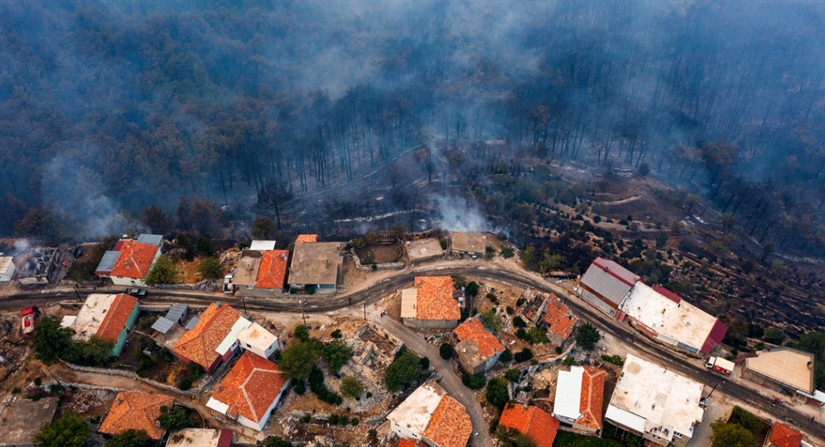When Disaster Strikes Your Dental Practice: Emergency Property Measures
June 12, 2024
TDIC’s risk management analysts offer advice on the proper steps to take if your practice is threatened or damaged by a wildfire or other natural disaster.

Natural disasters due to climate change are increasingly common. When weather events taking place around your practice cause heightened concern about property damage, personal safety is always the priority. Closely follow alerts in the area from federal alert systems, local or state wildfire websites and threat intelligence systems and be prepared to follow instructions for sheltering in place or evacuation.
While several weather-related events can pose risks to both people and property, wildfires are of particular concern to many TDIC policyholders. Property damage due to wildfires has increased in the past decade throughout the United States. TDIC’s risk management analysts offer the following guidance for dentists responding to the threat of wildfire, but it can be generally applied to other natural disasters.
During a Wildfire
If your property is in the potential path of a wildfire – or any other natural disaster -- use these tips to reduce damage and keep patients and employees safe in case of a wildfire:
- Close windows, vents, doors and blinds. The fire’s reach can be limited when access to the interior of your property is blocked.
- Shut off gas, pilot lights and propane tanks. Turning off the gas supply and other gas sources can prevent feeding the fire.
- Turn on all lights. Lights should be left on so firefighters can see the building under dark and smoky conditions.
- Shut off heating, ventilation and air conditioning (HVAC) systems. HVAC systems should be turned off to prevent outside smoke from entering the building and causing preventable damage.
- Move flammable items inside. Outdoor seating, tables, signage and other loose items must be moved inside so they won’t catch sparks (or become airborne, in case of high winds).
- Heed evacuation warnings. Evacuation must take place as soon as it is deemed unsafe to stay; staff and patients must not wait to receive an emergency notification if threatened by a fire. Otherwise, they should be prepared to follow evacuation warnings from local officials. If unable to evacuate, stay inside, away from outside walls, and leave doors unlocked in case firefighters need to access the area.
After a Wildfire
If the unimaginable happens and your practice is damaged by a wildfire, document the damage and file a claim as soon as possible. Some of the steps you can take to aid in claim resolution are:
- Take photos of damages if law enforcement, the fire department and city officials have allowed entrance to the building.
- Provide copies of inventory lists and financial documentation to your insurance adjuster.
- Do not start any cleaning or property removal until the loss site has been inspected by your insurance company.
- Verify companies and individuals offering assistance after the fire are licensed.
Along with contacting your property insurance agent to file a claim, other important calls to make after experiencing property damage are:
- Emergency board-up company. If windows or doors have been broken, contact local services to secure the premises.
- Property management. Once safe to do so, gain access to the premises to coordinate your repair efforts.
- IT service. If the loss involved the theft or damage to computer equipment, get support for remote access and restoring data.
- Dental equipment representative. If equipment may have sustained damage, request assessment and testing and/or the process for repair.
- Restoration company. Address water, smoke and fire damage as soon as possible.
Finding Resources and Support
Learn more about steps to take to ensure recovery after fire and water loss, theft and vandalism or computer loss and equipment breakdown in TDIC’s Property: Before and After a Loss guide.
TDIC’s Risk Management experts have created a wildfire resource page to aid policyholders in understanding coverage, preparing practices and safely responding to disruption caused by wildfires. Contact TDIC to review your coverage options or learn more about managing your risks. Additional information on preparing for an emergency can be found on the Federal Emergency Management Agency website.
TDIC’s Risk Management Advice Line is a benefit to TDIC policyholders. To schedule a consultation with an experienced risk management analyst, visit tdicinsurance.com/RMconsult or call 1.877.269.8844.